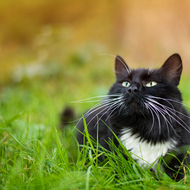
The charity is offering advice ahead of Earth Day.
Cats Protection, the largest feline charity in the UK, is offering top tips to pet owners on how to become more eco-friendly, ahead of Earth Day 2022.
Head of clinical services at Cats Protection, Alison Richards, explained why the charity is getting involved in committing towards a greener future: “Cats are generally very low maintenance pets, and they don’t need lots of expensive toys, bedding, or equipment to be happy and healthy.
“There are a lot of single-use plastic products on the market that we just don’t need to buy. So instead of diving into our coin purse and spending money on products that are harmful to our planet, we can swap the plastic for easy-to-make recyclable options.”
Cats Protection has put a number of eco-friendly measures in place to reduce its own carbon pawprint, including a 'zero to landfill' recycling company and running a printer ink cartridge recycling scheme in all shops.
Alongside this all plastic wrap has been removed from the organisation's cards and calendars, all donation bags are recyclable, the website is carbon neutral, and the factories used to create Cats Protection branded clothes and tote bags are powered by renewable energy.
In a press release, the charity shared the following advice:
Avoid plastic packaging:
Every year billions of plastic and aluminium food pouches end up in landfill sites. Look out for products with recyclable packaging and make sure to clean out the packet or tin and recycle it once empty. Some pet shops even offer the opportunity to bring along a container to refill dry cat food, saving considerably on packaging.
Get crafty:
New toys are expensive and come with a heavy carbon footprint. You can create plenty of homemade playthings that will be just as exhilarating for your cat. Toilet rolls and eggboxes make great puzzle feeders. Old socks can be upcycled into a thrilling cat toy – just fill the sock with a few spoonfuls of dried catnip, tie it off at the end and give to your cat to enjoy.
Fashion a fishing rod toy from a length of string and a garden cane for your cat to grab onto and play with. Cats also love boxes, so before you throw out a cardboard box, try cutting out a couple of holes for your cat to dash through.
Abandon luxury treats:
Cats don’t need fancy treats in addition to their regular meals. Instead, try taking some dry food out of your cat’s daily food allowance to offer as treats. However, if you do want to give your cat the occasional posh treat, then try making your own.
Homemade treats are not only more cost-effective, but they also save on the production of single-use packaging. Check out Cats Protection’s homemade meaty treat recipe here: https://youtu.be/Q3GIahkM0ck
Watch out for palm oil:
Palm oil production is incredibly harmful to wildlife and the environment, but it can still be found lurking in a large number of our foods. Make sure you read the label on all food products and either steer clear of those that use palm oil or research carefully to ensure the palm oil is sustainably produced.
Make your own cat bed:
Cats don’t need expensive beds – a cardboard box and a blanket or old jumper work just as well. If you’re feeling creative, try using felt tip pens or paint to give the box a unique and fun look.
Safely dispose of poo:
Never flush cat waste down the loo. Sewage treatments are not able to treat the parasites found in cat waste, which can make their way into our water system.
Check your cat litter:
Swap litter that contains environmentally harmful chemicals for an eco-friendly litter brand or use materials such as sawdust or shredded paper.
DIY scratching stations:
All cats need access to somewhere they can scratch to keep their claws in tip-top condition. Try replacing shop-bought posts with old carpet samples which are often cheaply available or even free at carpet shops.



 The latest
The latest